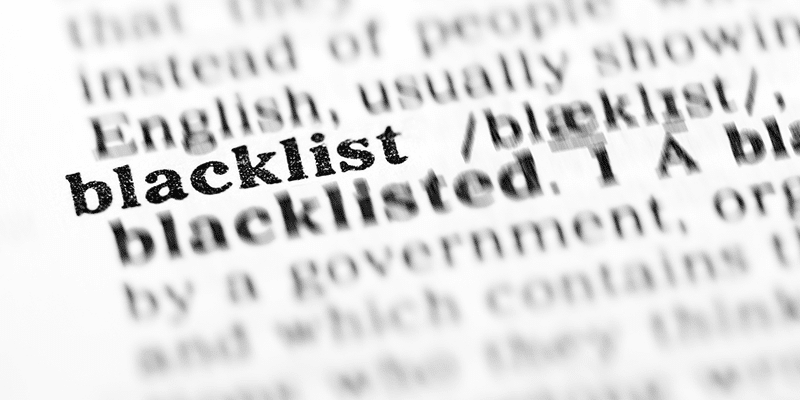We have been discussing media rating systems being used to target advertisers and revenue sources for certain cites and companies. NewsGuard and the Global Alliance for Responsible Media (GARM) have been criticized as the most sophisticated components of a modern blacklisting system targeting conservative or dissenting voices. I recently had a series of exchanges with NewsGuard after a critical column. Now, the House Judiciary Committee under Chairman Rep. Jim Jordan (R-Ohio) is moving forward in demanding documents and records from leading companies utilizing the GARM system, a company that I have previously criticized. It is a welcomed effort for anyone who is concerned over the use of these blacklisting systems to curtail free speech. However, time is of the essence.
The demand to preserve evidence went to various companies, including Adidas, American Express, Bayer, BP, Carhartt, Chanel, CVS and General Motors.
In my new book, I discuss the rating systems as a new and insidious form of blacklisting. Notably, Elon Musk has now filed a lawsuit against GARM and may be able to get more evidence out in discovery on the operations of this outfit.
It is an effort to strangle the financial life out of sites by targeting their donors and advertisers. This is where the left has excelled beyond anything that has come before in speech crackdowns.
Years ago, I wrote about the Biden administration supporting efforts like the Global Disinformation Index (GDI) to discourage advertisers from supporting certain sites. All of the 10 riskiest sites targeted by the index were popular with conservatives, libertarians and independents. That included Reason.org and a group of libertarian and conservative law professors who simply write about cases and legal controversies. GDI warned advertisers against “financially supporting disinformation online.” At the same time, HuffPost, a far-left media outlet, was included among the 10 sites at lowest risk of spreading disinformation.
Once GDI’s work and bias was disclosed, government officials quickly disavowed the funding. It was a familiar pattern. Within a few years, we found that the work had been shifted instead to groups like the GARM, which is the same thing on steroids. It is the creation of a powerful and largely unknown group called the World Federation of Advertisers (WFA), which has huge sway over the advertising industry and was quickly used by liberal activists to silence opposing views and sites by cutting off their revenue streams.
Notably, Rob Rakowitz, head of GARM, pushed GDI and embraced its work. In an email to GARM members obtained by the committee last month, Rakowitz wrote that he wanted to “ensure you’re working with an inclusion and exclusion list that is informed by trusted partners such as NewsGuard and GDI — both partners to GARM and many of our members.”
GARM is being used by WFA to achieve what GDI failed to accomplish. The WFA site refers to Rakowitz as “a career change agent” who will “remove harmful content from ad-supported digital media.”
Rakowitz’s views on free speech are chilling and his work shows how these systems can be used to conceal bias in targeting the revenue of sites with opposing views.
Rakowitz has denounced the “extreme global interpretation of the US Constitution” and how civil libertarians cite “‘principles for governance’ and applying them as literal law from 230 years ago (made by white men exclusively).”
He appears to be referring to free speech. If so, it is deeply troubling. Some of us believe that free speech is a human right, not just an American right. Those “white men” include philosophers from the Enlightenment whose ideas were incorporated in the Framer’s view of inalienable rights like free speech.
The threat against free speech today is being led by private groups seeking to exercise an unprecedented level of control over what people can read and discuss.
Pundits and politicians, including President Joe Biden and former President Barack Obama, have justified their calls for censorship (or “content moderation” for polite company) by stressing that the First Amendment only applies to the government, not private companies. That distinction allows Obama to declare himself to be “pretty close to a First Amendment absolutist.” He did not call himself a “free speech absolutist” because he favors censorship for views that he considers to be “lies,” “disinformation,” or “quackery.”
The distinction has always been a disingenuous evasion. The First Amendment is not the sole or exclusive definition of free speech. Censorship on social media is equally, if not more, damaging for free speech. Those who value free speech should oppose blacklisting systems, as was the case during the McCarthy period. Now that conservatives and libertarians are being blacklisted, it is suddenly less troubling for many on the left.
Rakowitz now wields massive influence over public discourse in this collaboration with corporations and groups like GDI. As was done to the left during the McCarthy period, blacklisting systems are now being used to control public access to information by choking off the revenue of sites.
The current anti-free speech movement is the most dangerous in history due precisely to this sophistication and the unprecedented alliance of corporate, media, academic, and government interests.
GARM and other media rating systems have been embraced by many who would prefer to silence opposing voices than respond to them. Rakowitz was wildly popular at Davos in calling for a “safer” Internet that would target dangerous sites much like GDI: “GARM has been officially recognized as a key project for 2020 within the WEF’s platform on Shaping the Future of Media Entertainment and Culture.”
The House committees are pushing forward with a sense of urgency. It is clear that the investigations in government-supported censorship and these blacklisting operations will end if the Democrats retake the house. It is expected that these companies will seek to delay any disclosures in the hope that the House will change hands and this system will again be allowed to recede back into the darkness.
Reprinted with permission from JonathanTurley.org.

